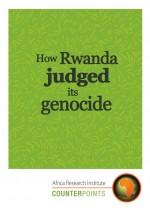How Rwanda Judged its Genocide – New Africa Research Centre ‘Counterpoint’ by Phil Clark

 Latest in the Africa Research Institute‘s excellent Counterpoints series is by SOAS lecturer Dr Phil Clark, and deals with Rwanda’s Gacaca courts.
Latest in the Africa Research Institute‘s excellent Counterpoints series is by SOAS lecturer Dr Phil Clark, and deals with Rwanda’s Gacaca courts.
INTRO
‘Since 2001, the gacaca community courts have been the centrepiece of Rwanda’s justice and reconciliation process. Nearly every adult Rwandan has participated in the trials, but lawyers are banned from any official involvement. Human rights organisations fiercely opposed the use of gacaca for trying genocide cases, on the grounds that it fell short of international legal standards of fairness. Much criticism
reflects legal rigidity towards the unprecedented challenges confronting post-genocide Rwanda – and a limited understanding of the aims of the community courts. Gacaca
was inevitably imperfect, but also highly ambitious and innovative. While the full impact of the process will not be apparent for many years, gacaca has delivered benefits to Rwandans in the spheres of justice, truth and democratic participation. Other societies confronting the aftermath of mass conflict could learn much from Rwanda’s approach to local justice.’
Phil Clark is an engaging writer on this subject, and can be counted as one of the world’s foremost experts on Rwanda.
To read/download the Counterpoint in full click here






